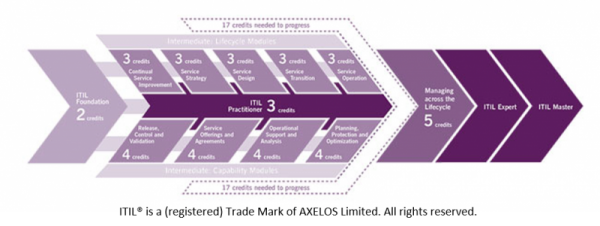
What is ITIL?
ITIL is an acronym for the Information Technology Infrastructure Library that was created in the 1980s by the UK Government’s Central Computer and Telecommunications Agency. The agency understood that a set of standardized service management practices was necessary to align service management delivery from one agency to another. What started out as a set of recommendations grew into ITIL V1. ITIL has had several versions with V1 arriving in late 80s, V2 in late 90s, V3 in 2007 and then ITIL 2011. ITIL is currently undergoing another revision to include how ITIL relates to other frameworks and standards including Agile, DevOps, Lean, ISO 20000 and more.
Who Uses ITIL Today?
The figures vary. In Europe it is suggested that up to 70% of European business leaders consider ITIL a must have in their organizations . Outside of the UK the number of organizations that have adopted and adapted ITIL is estimated to be around 33%.
Why Do Organizations Adopt ITIL?
When organizations adopt and adapt ITIL, they ensure that their services are delivered according to well defined best practices that allows them to increase customer satisfaction and better manage their processes and reduce costs.
ITIL Certification Salaries
No doubt certifications assist in higher paying jobs and raises. Most report that holding an ITIL Foundation Certification can jump your salary $5,000 to as much as $13,000. The 2016 Global Knowledge IT Skills and Salary Report shares that the average salary for ITIL-certified professionals ranges from $92,000 to $105,842 and that more than 90 percent of respondents to their survey reported their average salary with an ITIL Foundation certificate exceeded $98,000.
How to Get ITIL Certifications
#1 – ITIL Foundation
You start with the Foundation Certification. It is a TON of information. There is no requirement to take an accredited course to pass the exam, however it is HIGHLY recommended. The exam is 100% on the content in the course. When you take an Accredited ITIL Foundation course then you know for sure you are getting all the info you need to pass. Courses are available live at training organization location, live online and On-Demand to give you ultimate flexibility.
#2 – What Next After ITIL Foundation?
After ITIL Foundation Certification you can go on to become ITIL Practitioner Certified or move into the ITIL Intermediate courses.
ROUTE 1 = ITIL Practitioner
This is a relatively new certification that was released about 2 years ago and it is the only course out of 12 that actually shows students how to adopt and adapt ITIL. ITIL Practitioner like ITIL Foundation has no formal training requirement, however, it has the lowest pass rate of all 12 exams. There is a great deal of knowledge and practical experience required to pass this exam and we do not recommend students take this exam without having (1) taken the ITIL Practitioner course and (2) taken at least one of the ITIL Intermediate courses. The exam requires you to adopt and adapt what you learned. It is not repeating concepts. It is the most expensive ITIL exam retailing at $469 from PeopleCert.
Route 2 = The ITIL Intermediate Path
This is the second option and the more common path following ITIL Foundation Certification. AND – YOU MUST hold an ITIL Foundation certificate to take these exams. To take any of these exams you MUST have taken an Accredited Course and hold a Certificate of Completion. The Intermediate series is made up of 9 courses split into a Lifecycle track and a Capability track. You can stick with one path or mix and match from the both.
i. Intermediate Service Lifecycle Courses – Managers take this path
1. Service Strategy
2. Service Transition
3. Service Design
4. Service Operation
5. Continual Service Improvement
ii. Intermediate Capability Courses – The people who do the work/implement ITIL take this path
1. Service Offerings and Agreements
2. Planning, Protection and Optimization
3. Release, Control and Validation
4. Operational Support and Analysis
#3 – Becoming an ITIL Expert
After Foundation and completing 17 credits in one of these paths or a combination of courses (some people like to mix and match), then the student has enough points to take the Managing Across the Lifecycle course (MALC) which allows them to sit for the MALC exam. You need a minimum of 17 credits to take MALC.
a. Foundation is 2 credits
b. Lifecycle course are 3 each
c. Capability are 4 each
d. MALC is 5
#4 – PeopleCert Certification Exam
Once you have prepared for an exam and hold the required Certificate of Completion for the Intermediate and MALC courses, then you are ready to purchase and take your exam. The official exam provider for all ITIL exams as of January 1, 2018 is PeopleCert. You can purchase your ITIL Exams from PeopleCert directly or from an Authorized Exam Organization. Exams can be taken at exam centers and Online so you can take them from the comfort of your home or office.
We hope this article on ITIL Certification has been informative and helpful. If you have any questions, we are here to help. You can reach us by phone at, 877.546.4446 or via email at, customerservice@gogotraining.com





